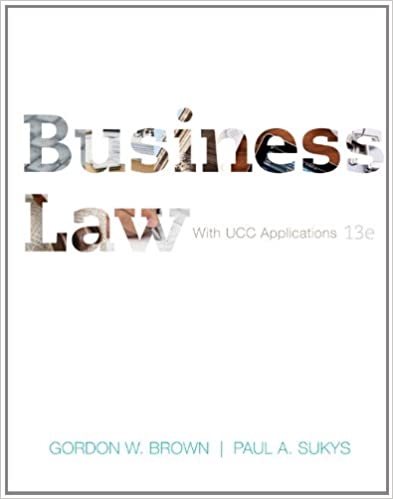
Business Law with UCC Applications 13th Edition by Gordon Brown,Paul Sukys
Edition 13ISBN: 978-0073524955
Business Law with UCC Applications 13th Edition by Gordon Brown,Paul Sukys
Edition 13ISBN: 978-0073524955 Exercise 2
One of the premiere economists of the last century was a Harvard professor named Joseph Schumpeter, who wrote a treatise entitled Capitalism, Socialism, and Democracy in which he foretold the ultimate end of the capitalist economic system. Oddly, Schumpeter was himself a confirmed capitalist, so when he predicted the end of the capitalist economy, it was without joy or pleasure. In fact, it was more of a warning than a prediction, offered with the hope that something could be done to divert the path away from destruction. Schumpeter's affection for capitalism is described in the following passage, penned by Allen M. Sievers in his study, Revolution, Evolution, and the Economic Order:
The capitalist, for one thing, wishes to provide for his family, and indeed capitalism is really not individual centered but family-centered. Further, the capitalist shares in lesser degree the romantic adventure some ness which characterized feudal society, or there would be no risky innovation or entrepreneurial exploit. Capitalism also requires a kind of symbiosis with the aristocracy and other non-bourgeois elements to run the state, and this depends on a kind of loyalty by these classes to capitalism. The masses must also be awed by the glamor or prestige of capitalist success in order to submit to the discipline necessary for business production. The business classes themselves must have an esprit de corps and a devotion to their way of life, as well as a code of ethics if the contract and property system is to work. We might say in sum, that Schumpeter believed that capitalist civilization is based on a rationalism qualified just a bit by other human qualities. Allen M. Sievers , Revolution, Evolution, and the Economic Order, p. 41
We can distill from this quotation five essential qualities of the capitalist: (1) family-centeredness, (2) a willingness to take risks, (3) loyalty to the capitalist ideal, (4) awe at the success of capitalistic ventures, and (5) a code of ethics that permits the rules of contract and property law to work.
According to Sievers, capitalism requires an integration of the aristocratic and the working class elements of society. Is such an integration promoted or hampered by the partnership form of doing business? Explain.
The capitalist, for one thing, wishes to provide for his family, and indeed capitalism is really not individual centered but family-centered. Further, the capitalist shares in lesser degree the romantic adventure some ness which characterized feudal society, or there would be no risky innovation or entrepreneurial exploit. Capitalism also requires a kind of symbiosis with the aristocracy and other non-bourgeois elements to run the state, and this depends on a kind of loyalty by these classes to capitalism. The masses must also be awed by the glamor or prestige of capitalist success in order to submit to the discipline necessary for business production. The business classes themselves must have an esprit de corps and a devotion to their way of life, as well as a code of ethics if the contract and property system is to work. We might say in sum, that Schumpeter believed that capitalist civilization is based on a rationalism qualified just a bit by other human qualities. Allen M. Sievers , Revolution, Evolution, and the Economic Order, p. 41
We can distill from this quotation five essential qualities of the capitalist: (1) family-centeredness, (2) a willingness to take risks, (3) loyalty to the capitalist ideal, (4) awe at the success of capitalistic ventures, and (5) a code of ethics that permits the rules of contract and property law to work.
According to Sievers, capitalism requires an integration of the aristocratic and the working class elements of society. Is such an integration promoted or hampered by the partnership form of doing business? Explain.
Explanation
S had largely emphasized on the integrat...
Business Law with UCC Applications 13th Edition by Gordon Brown,Paul Sukys
Why don’t you like this exercise?
Other Minimum 8 character and maximum 255 character
Character 255


